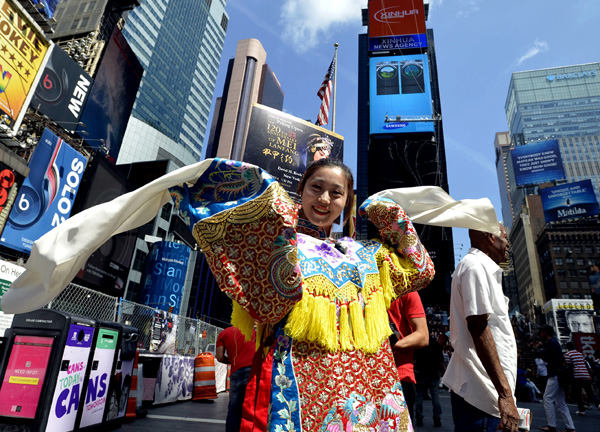
20 Mar, 2015
China’s global image on the upswing
Beijing, (China Daily), March 19, 2015 – China’s national image has been improving over the past few years, with President Xi Jinping becoming a highlight, according to a survey report. The global survey, based on 4,500 respondents from nine countries last year, found that China’s overall image has been increasingly recognized by the global community.
|
“More people in the nine countries are convinced of China’s future robust economic growth,” Wang Gangyi, vice-president of China International Publishing Group, said of China’s National Image Global Survey 2014, which was released in Beijing on Wednesday.
The nine countries-the United States, the United Kingdom, Australia, Japan, South Africa, India, Russia, Brazil and China-represent different geographic regions and stages of economic development.
The average score of China’s national image in 2014 was 5.9 on a scale of 1 to 10, up from the previous year’s 5.1, according to the study conducted by the Center for International Communication Studies of China Foreign Languages Publishing Administration, Millward Brown and Lightspeed GMI.
President Xi Jinping is a highlight of the survey, according to Wang.
The survey found that Xi was the fourth best-known among the leaders of the nine countries, with 70 percent of the respondents having heard of him, after US President Barack Obama (97 percent), Russian President Vladimir Putin (91 percent) and British Prime Minister David Cameron (86 percent).
“Xi’s handling of both domestic and international affairs has won high praise. He ranks second, after newly elected Indian Prime Minister Narendra Modi, for his capability of handling domestic and international affairs,” he said.
Overseas respondents are divided about China’s global image.
About 46 percent of overseas respondents said China’s image is one of “having rapid economic growth with its people enjoying relatively high living standards”, while 45 percent believed that China is a country with “a big gap between the rich and the poor”.
More than half of the respondents are optimistic about China’s future development, with 37 percent saying they believe China’s economy will keep growing at a rapid rate, and 20 percent saying they believe China will overtake the US to become a superpower.
The study found that people from emerging economies tend to have a better appreciation of China’s development.
“Most people in emerging economies regard China as an important force for maintaining world order and peace, while many from the developed countries still believe in a China military threat,” he said.
Dong Guanghua, group account director of Millward Brown, said the going-global strategy of Chinese companies has also helped improve the country’s national image.
“About 36 percent of the overseas respondents thought that Chinese enterprises doing business in their countries would bring new capital and technology, and 32 percent thought they would increase employment opportunities,” said Dong.
Chinese brand products, with better quality and innovation, are being embraced by more foreign consumers in recent years, and many foreign respondents are familiar with Chinese brands including Lenovo, Huawei, Air China, Haier and Alibaba, he said.
However, Chinese products still need to improve quality and after-sales service, which sometimes hold back foreign consumers from buying Chinese brand products and hamper the national image, he suggested.
According to the study, the young are more familiar with China, with 34 percent of the respondents aged 18 to 35 knowing about China, with the equivalent score being 28 percent for those aged 36 to 50 and 20 percent for those 51 to 65 years old.
Young people, especially those aged 18 to 35, also tend to have a better impression and more positive attitude toward China and are more optimistic about China’s future, compared with their senior counterparts, it said.
Yu Yunquan, deputy director of the China International Publishing Group, said that the better view by youth has a lot to do with the channels through which they get to know China, and he believed China’s national image will gradually improve.




Liked this article? Share it!